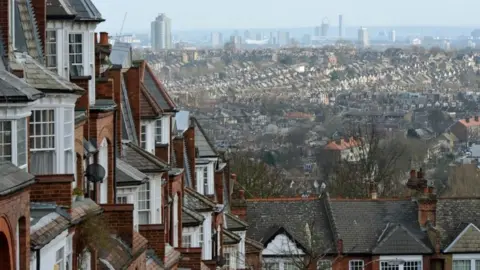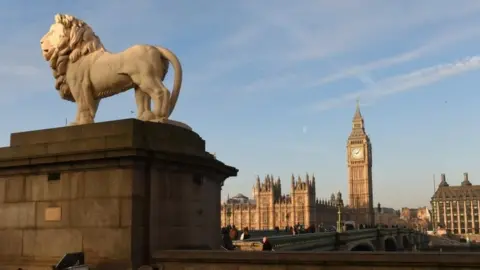London councils need '£500m more to balance the budget'
 BBC
BBCLondon's councils are gearing up for another year of financial hardship, claiming they need £500m extra in funding to balance the books.
They say they will need to find cuts and savings of at least £526m next year, rising to £1.4bn over three years.
Before the government announces later this week what their budgets will b, the councils are making a last-ditch appeal for more cash as they say the methods they have been using to boost their coffers - such as raising council tax and one-off emergency payments - are not sustainable solutions.
To help pay for adult social care, north London's Camden Council, increased its council tax by 2% this year. However, that only raised £4.8m but the cost of providing social care rose by more than £11m, from £53.7m to £64.8m.
So the council tax precept rise - encouraged by government - covered less than half of Camden's increased costs.
One-off payments have been forthcoming from the government to stave off crises in the adult social care sector but councils say they do not enable long-term planning or solve the underlying problem.
The same is expected to happen next year.

Facing the need to save £23m overall, Camden is reviewing the number of nursery classes in the borough, considering cuts to its transport services and removing all cash parking meters from the borough, encouraging residents to pay for parking and permits online.
But many councils are now experiencing similar pressures in child social care too.
They arise from a combination of an increased call on resources to pay for both child protection and Special Educational Needs and Disability (SEND).
That in itself may be occurring for a positive reason that there's more awareness of complex needs and thus more demand.
However, London's councils say meeting this statutory duty is sucking money away from other local services like libraries, waste collection and roads.
Differing priorities
Back in 2015 north London's Barnet Council - then controlled by the Conservative Party - vowed to deal with its pothole problem by injecting £50m into fixing them across five years. There is £10m left to spend next year and the council is keen to fulfil its promise.
But it needs to find savings of £67m over the next three years. It says some things will have to give.
Its proposals for £23m of savings next year include plans for commercial rent rises, more revenue from advertising and a management restructuring.
But the council warns financial constraints may mean it "stops doing some things or does them in a more efficient way, as well as looking at how it can find opportunities to generate more income".

A shortage of affordable housing across the capital continues to present acute difficulties to London councils.
Last year 22,000 people used Southwark's drop-in housing service in south London. Many were seeking urgent temporary accommodation and there is also an increasing number seeking advice on renting in the private sector, according to the council.
Councils have gained more legal responsibilities since the Homeless Reduction Act became law.
Southwark Council is the country's biggest social landlord with 39,000 homes but approximately 1,500 council homes have come free to re-let this year.
Five years ago that was in the region of 7,000.
And so more and more people are going away disappointed and frustrated.
Extra funding
Separately this week there is a warning from a group of London Labour councillors that councils are facing a likely cut in government grant totalling £235 m next year.
They recently held a campaign event in Sidcup, the constituency of James Brokenshire, the Local Government Secretary, who is due to reveal the latest spending plans in the local government finance settlement on Thursday.
A spokesperson for the Housing, Communities and Local Government said: "Councils across London are piloting 100% business rates retention this year and according to their own forecasts will able to retain around £240m additional business rates growth income.
"We announced over £1bn of extra funding for local government in the Budget, and this means a real terms increase in resources available to local government in 2019-20."
